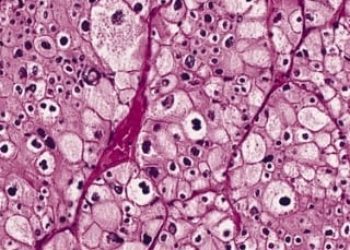Sorafenib increases progression-free survival in patients with desmoid tumors
1. After 2 years of treatment with sorafenib, patients with desmoid tumors had significantly increased progression-free survival rates compared to patients randomized to a placebo treatment.
2. Adverse effects most commonly reported by patients in the sorafenib group included rash and fatigue.
Evidence Rating Level: 1 (Excellent)
Study Rundown: Desmoid tumors, also known as aggressive fibromatosis, are rare connective tissue neoplasms with no standard systemic treatment. While the tumors do no metastasize, patients may experience both symptoms and possibly increased mortality due to local growth and tissue invasion. While local surgery or radiation may be utilized, recurrence after treatment does occur. A prior study showed potential benefit to patients with treatment using the tyrosine kinase inhibitor sorafenib, prompting this study to further evaluate the efficacy and safety of this treatment for patients with desmoid tumors. Patients randomized to treatment with sorafenib experienced an increased 2-year progression-free survival rate, the primary outcome, compared to those treated with placebo. Most patients in the sorafenib group experienced adverse events, with the most common being rash and fatigue.
This study further evaluated a promising treatment strategy for patients with desmoid tumors, a diagnosis presently without a standard systemic therapy. Strengths of the study include its randomized design, follow-up with imaging, and extensive adverse event monitoring. Limitations include limited enrollment partially due to the rare nature of the disease, poor definition of objective response, and immaturity of survival and crossover data.
Click to read the study in NEJM
Relevant Reading: Desmoid tumors: a review of their natural history, imaging, and treatment
In-Depth [randomized controlled trial]: This phase 3, multicenter, randomized, placebo-controlled trial enrolled patients between 2014 and 2016. Eligible patients had a diagnosis of desmoid tumor and radiographic progression of disease within the prior 6 months, recurrence after local treatment, or symptomatic disease. Patients were randomized in a 2:1 ratio to sorafenib (n=50) or placebo (n=37) groups, and patients were followed for a median of 27.2 months. The primary endpoint, progression-free survival at 2 years, was 81% in the sorafenib group and 36% in the placebo group (hazard ratio for disease progression or death, 0.13; 95% confidence interval [CI], 0.05 to 0.31; P<0.001). Objective response, defined with imaging performed every 8 weeks during trial enrollment, occurred in 33% of the treatment group and 20% of the placebo group. For patients who showed a response on imaging, the mean time to response was 9.6 months in the treatment group and 13.3 months in the placebo group. For the 85 patients with adverse response data, grade 3 or 4 adverse events occurred in 47% (23/49) of those in the treatment group and in 25% (9/36) of the placebo group. The most common grade 1 or 2 adverse events in the treatment group included rash (73%) and fatigue (67%).
Image: PD
©2018 2 Minute Medicine, Inc. All rights reserved. No works may be reproduced without expressed written consent from 2 Minute Medicine, Inc. Inquire about licensing here. No article should be construed as medical advice and is not intended as such by the authors or by 2 Minute Medicine, Inc







